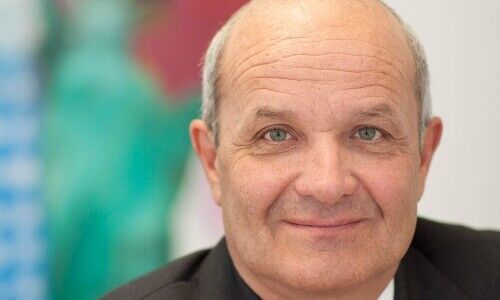Despite pronounced recession fears on the US side of the Atlantic, the American Swiss chamber of commerce CEO told finews.com why the US is the most important market for Swiss companies to focus on this year.
Martin Naville has been at the helm of the Swiss American Chamber of Commerce for 18 years promoting Swiss-American business ties. The association addresses issues hindering the free flow of goods, services, people, and investments between the two countries.
Switzerland's financial center is currently «as clean as it possibly can be,» Naville said in an interview with finews.com. This is partly thanks to the banking industry's rehabilitation after the tax evasion dispute with US authorities.
However, criticism against the sector’s players «is always posthumous, » he added.
Recent media reporting on Roman Abramovich having held at least $700 million at UBS at the beginning of Russia’s war on Ukraine, is an example of a bank being criticized for servicing and hanging on to clients who were once legitimate but have fallen into disgrace since.
However, as the media also pointed out in the case of Abramovich, the Swiss government has considered the Russian businessman a reputational risk for Switzerland since 2018.
Statute of Limitations
From the bank’s perspective «as long as a client fulfills all requirements, the bank should be allowed and feel safe onboarding a client,» Naville said, adding that banks and governments should be guided by what was legal at the time and not apply today’s rules to wrongdoings from the past.
This should also be the way they assess the origins of an individual client’s wealth. «Many families became rich because of a colonial background for things that were completely legal at the time,» he said, asking whether we can judge past behavior with today’s rules.
Naville’s view contrasts with the actions being undertaken by the Trevelyans, an aristocratic Family in the UK, who are set to publicly apologize to the people of Grenada, where its ancestors had more than 1,000 slaves in the 19th Century, as the «BBC» reported this weekend.
For Naville, who would prefer to look to the future than to the past, the same goes for institutions. If a Swiss bank hid facts it should have declared to the US authorities 10 or 15 years ago, then the bank does not fall under the statute of limitations and should be handled accordingly, but «failing this we should look forward,» he said.
At the same time, Naville acknowledges there could be other sources feeding into the intensified scrutiny on the country’s financial center, which benefits from being a secure place with a stable currency and steady political environment.
«It is evident that we are always going to attract more investments than our normal share. This can create some jealousy,» he said.
Contradictory Imperatives
The pressure on Switzerland is also mounting after it adopted EU sanctions against Russia, making it «all the more difficult for Switzerland to stand in the middle,» Naville said while pointing out that freezing funds and expropriating them for other purposes, «should not be confused for political reasons.»
For him, the recent debate that Switzerland has left neutrality is «totally misleading.»
The way he sees it, Switzerland has three primary imperatives: To be neutral, to be part of the normative countries with democracies and human rights, and to protect the human rights convention from Geneva. «It will always be important to square these sometimes contradictory imperatives,» he said.
Fantastic US Run
One area Naville sees no ambivalence is in the opportunity that lies ahead for Swiss companies looking to do business in the US. These companies are up for a «fantastic run» this year, he said.
His forecast is based on growth in US exports over the last 10 years, which equaled 10 percent annually and now stands at nearly 20 percent of the country’s total sales worldwide. In 2021, US exports even landed first place, «surpassing exports to Germany for the first time in history,» he said.
Apart from the advantage of having a long presence in the US, Swiss companies active in infrastructure, manufacturing 4.0, sustainable energy, and health care, are also set to benefit from massive US subsidies in the coming years, Naville said.
UBS also sees the US as a growth market for its wealth management business. In an attempt to gain more high-net-worth money, Switzerland's biggest bank is even chasing rich individuals into the southern states of Florida and Texas.
And with Switzerland’s relationship with the EU troubled and business with China getting more complicated by the day, «where else than in the US should export-driven Switzerland find relevant growth?» Naville asked.
With this in mind, «each federal councilor should visit the US three to four times a year,» he added.
































